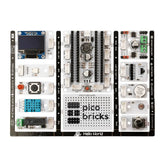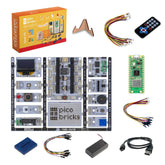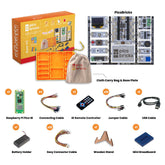Raspberry Pi 5 vs 4! | What has changed in 4 years?
Finally! The mesmerizing Raspberry Pi 5 has been introduced, 4 years after the launch of the Raspberry Pi 4. There were doubts about whether it would be released this year, but despite all the uncertainties, the latest version of the microcomputer, the Raspberry Pi 5, is now available for purchase.
It comes in two versions: Raspberry Pi 5 8GB and 4GB. The price for the Raspberry Pi 5 8GB version is set at $80. This new version brings many notable upgrades. One of its most important features is that it is three times faster than its predecessor! Additionally, it holds the distinction of being the first Raspberry Pi computer designed with native silicon in the United Kingdom.
Let's take a closer look at these two wonders. Raspberry Pi 5 vs 4!
Table of Contents
What Exactly is Raspberry Pi 5?
The Pi 5 features a component known as the southbridge, produced by the Raspberry Pi Foundation for the first time. This component, called RP1, is part of the motherboard and helps it communicate with peripheral devices. The Raspberry Pi Foundation claims that the RP1 southbridge offers a significant improvement in peripheral performance and functionality, enabling faster data transfer to external UAS drives and other peripherals.
Additionally, the Pi 5 includes two four-lane 1.5Gbps MIPI transmitters, allowing you to connect two cameras or one display. It also introduces a single-lane PCI Express 2.0 interface, supporting high-bandwidth peripheral devices. However, you'll need a separate adapter, like an M.2 HAT, for this feature.

In terms of ports, the Pi 5 boasts dual 4Kp60 HDMI outputs with HDR support, a microSD slot, two USB 3.0 ports, two USB 2.0 ports, Gigabit Ethernet, and 5V DC power via USB-C.
Other great features include Bluetooth 5.0 and Bluetooth Low Energy (LE) support, along with high-speed SD card performance through the SDR104 mode. All these upgrades make the Raspberry Pi 5 even more versatile, suitable for use as a high-budget desktop PC, media server, or even a DIY security system. With these features, the Pi 5 is usable in many more fields.
Raspberry Pi 4 vs 5
Raspberry Pi 5 vs 4? If you're a hobbyist, educator, or tech enthusiast, you know the thrill of working with these versatile little computers. With the launch of the Pi 5, it's time to explore what makes this new model a worthy successor to the popular Pi 4. Let’s dive into a detailed comparison to help you decide which one fits your needs better.
- Raspberry Pi 5 Delivers 3 Times Better Performance Than Its Predecessor! -
The Raspberry Pi 5 is powered by a 64-bit quad-core Arm Cortex-A76 processor running at 2.4GHz, offering 2-3 times more performance compared to the four-year-old Raspberry Pi 4. It also features an 800MHz VideoCore VII GPU, which the Raspberry Pi Foundation claims provides a significant boost in graphics performance.
Early testers have noted that the Raspberry Pi 5 boots quickly and loads web pages much faster compared to the older Pi 3 Model B+. While some users have mentioned that the Pi 5 tends to run hot, the Raspberry Pi Foundation addresses this issue by including an active cooling component that can be mounted directly onto the board.
Now, let's take a closer look at these differences in the table below:
| / |
Raspberry Pi 4 |
Raspberry Pi 5 |
|
Power and Performance: |
Quad-core Cortex-A72, 1.5 GHz. |
Quad-core Cortex-A76, 2.4 GHz, much faster. |
|
Memory: |
Up to 8GB RAM. |
Same RAM options, faster LPDDR4X. |
|
Connectivity and Ports: |
Two micro-HDMI, four USB (two USB 3.0, two USB 2.0). |
Two full-size HDMI, four USB (two USB 3.0, two USB 2.0), PCIe 2.0. |
|
Additional Features: |
Bluetooth 5.0, Gigabit Ethernet. |
Bluetooth 5.2, better Ethernet, power button, PCIe interface, fan header. |
|
Power Supply: |
5V/3A power supply. |
5V/5A power supply. |
The Raspberry Pi 5 brings significant improvements in processing power, memory speed, and connectivity over the Pi 4. Whether you're working on simple projects or diving into advanced applications, the Pi 5 offers the enhanced capabilities you need to take your projects to the next level.
Raspberry Pi 5 Power Supply
Finding the right power supply is crucial for keeping your Pi 5 happy and humming. Here’s how to make the best choice:
1. Power Up Right:
Your Pi 5 needs a 5V/3A power supply for optimal performance.
2. Connector Perfect:
Use a USB-C connector for a snug and reliable connection.
3. Quality Counts:
A high-quality power supply ensures stable operation without voltage drops.
4. Safety First:
Look for features like over-voltage, over-current, and short circuit protection.

With the perfect power supply, your Raspberry Pi 5 will be ready for any project you dream up. Let the fun begin!
For more insights into technological innovations like this, visit our blog page :)
Ready to upgrade?




